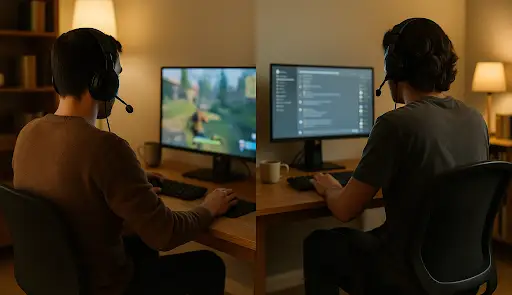
Why Gaming Friendships Often Last Longer Than Real-Life Ones
You lose touch with classmates. Colleagues vanish the day you change jobs. Neighbours move and barely wave from across the street. Meanwhile, someone you met in a lobby three years ago still logs on to the game with you every Thursday. No birthdays. No brunches. Just a habit.
The friendships that form online, especially in games, don’t just survive distance and time. They often last longer than those built face-to-face. Why? The answer isn’t abstract. It comes down to routine, function, and the absence of everything that makes real-life relationships stall.
Games Create Task-Based Bonds That Don’t Require Small Talk
Friendships at school or work usually start because you’re placed in the same environment, not because you’re solving anything together. Most interactions revolve around surface talk – what you did last weekend, who’s annoying in the office, when the next break is. Cooperation, if it happens, is incidental.
Games don’t allow that passivity. You enter a co-op mission or MMO raid knowing exactly what your team needs from you. Success means staying alert, coordinating, backing each other up. This also applies in strategic formats like online poker, where platforms such as PokerStrategy Canada help players access consistent match environments. Over time, seeing the same names at the same tables builds a sense of familiarity, not because of chat, but because of repetition and reliable behaviour.
In this scenario, trust forms through action: defending, assisting, and reviving. The absence of small talk doesn’t weaken the bond. It keeps focus on shared action. Consequently, reliability becomes the connection. That holds longer than conversation ever does.
Online Interaction Lowers Risk of Social Burnout
Physical socializing comes with costs that aren’t always visible but always felt. People have to coordinate plans, make themselves presentable, travel, sometimes host, and often stay longer than they want out of politeness. For some, this routine doesn’t feel energizing. Rather, it feels like work.
Gaming removes most of that. You log in. You play. You leave when you’re done. Nobody notices if you wore the same hoodie three nights in a row or if you muted your mic during dinner. You’re present for the task, not for judgment. That ease makes it possible to connect consistently without running out of energy or patience.
While face-to-face friendships have been linked to lower blood pressure and better long-term health, they demand physical presence, emotional availability, and time coordination – things many players find hard to offer consistently in a busy or isolating environment.
This reduced pressure of virtual presence meets the needs of people who are introverted, neurodivergent, chronically busy, or simply drained by traditional social formats. The bonds created stay strong because the barrier stays low.
Shared Routines Form Without Formality
When friendships require excessive planning, they often fade. Someone forgets to text back and then the other cancels. Schedules drift and appointments get postponed by default, almost automatically. You meant to meet up, but months passed. And nobody’s angry, just tired. Real-life socializing often dies quietly in the space between “let’s” and “when.”
Gaming, on the other hand, doesn’t require negotiation. You finish work, sit down, and log in. No confirmation texts. No calendar invites. The routine builds itself. You’re used to seeing the same people in the same time slots, and so are they. The rhythm holds because nobody has to manage it.
There’s no expectation to “catch up” in a deep way before the game starts. Conversation happens if it happens. What matters more is the shared experience, the funny glitch, the clutch win, the failed boss fight that leads to a better second attempt. These events replace the need for special occasions. They give the relationship shape through repetition, not rarity.
Emotion Is Filtered Through Action, Not Drama
During in-person conversations, emotional cues are layered and often misread. Facial expressions, tone shifts, awkward pauses, or silences that arrive at the wrong moment can turn neutral interactions into fragile ones. Even casual conversations demand social calibration, and the cost of getting it wrong is often outsized compared to the intent.
Digital games reduce that ambiguity by tying interaction to purpose. Affection here isn’t measured by phrasing or timing but by what someone does when you need them – dropping a potion, reviving your character, staying calm under pressure. What might feel like an emotional gap is, in practice, a kind of clarity. In short, disagreements don’t escalate because they’re framed in tactical terms, not personality clashes.
A 2022 Frontiers in Psychology study found that video games satisfy basic psychological needs like feeling capable, connected, and in control – especially when social interaction happens through shared tasks instead of emotional conversation. That structure makes space for connection without requiring emotional output on demand, which is often where traditional friendships break down.
Games Remove Social Biases That Kill Friendships Early
In real life, friendships often don’t form because of quick judgments. A person may dress differently or speak with a certain accent, or just “seem off.” Social codes, many unspoken, decide who gets invited, who’s tolerated, and who’s ignored. These filters work before trust even has a chance to grow.
Gaming is much more fair here because it cuts most of the prejudice out immediately. When you play, you’re a name on a screen, not a résumé or a photo. Players judge you by what you do: how well you play, how reliable you are, how you communicate when it matters. That merit-based clarity opens the door for friendships across age groups, nationalities, income levels, and neurotypes.
When identities surface later, through voice chat or conversation, they do so on a foundation of earned respect. The connection isn’t based on shared lifestyle, but on shared reliability. That order of operations matters more than it seems.
The World Doesn’t Interrupt the Connection
In the physical world and real life, people move. They change jobs, have children and switch priorities. And somewhere along the line, real-life friendships disappear, not out of anger, but because availability vanished. The time and energy required to maintain contact no longer exist.
Gaming friendships are built differently. They’re not linked to geography or career stage. They’re linked to login time. This suggests that someone can change cities or start a new job and still be online at 9 p.m. for the usual session. Life can evolve, but the shared meeting point doesn’t require anyone to rearrange their calendar.
Because the connection isn’t tied to a physical place, it survives the kinds of changes that break most real-world friendships. That makes them more adaptable, and more resilient. Because routines hold steady even while life doesn’t and that creates lasting bonds.









